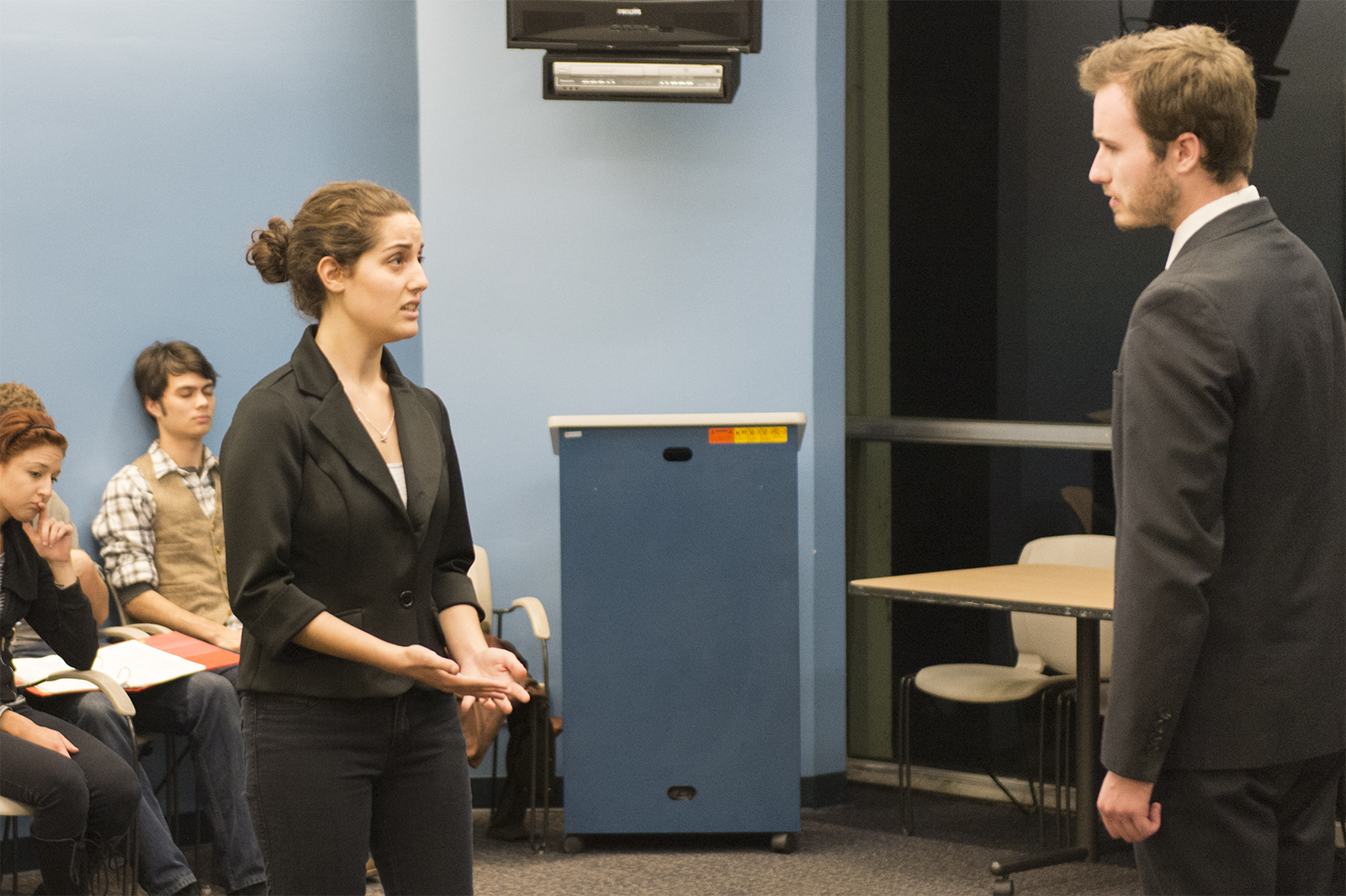Shakespeare Company pens contemporary translation of ‘Henry IV Part I’

“Henry IV, Part I,” put on by the Shakespeare Company at UCLA and UCLA Residential Life, will star fourth-year English student Neda Dallal (left) and third-year theater student Ian Runge (right). The play will take place Friday and Saturday in the Northwest Campus Auditorium. (Max Himmelrich/Daily Bruin)
By Daily Bruin Staff
Feb. 26, 2015 1:00 a.m.
It was 11 p.m. on a Friday night, but the lights in Ackerman Union 2408 were still on. Fourteen students gathered together and chanted the Bard’s lines.
They are members of the Shakespeare Company at UCLA and will present “Henry IV, Part I” Thursday for open rehearsal and Friday and Saturday for formal performances in the Northwest Campus Auditorium in collaboration with UCLA Residential Life. “Henry IV, Part I” depicts King Henry IV’s unquiet reign: his guilty feelings for disposing of his predecessor, hostility from the Percy family and his son Prince Hal’s questionable behavior.
Although there have been a few collaborations between SCU and Residential Life in the past, such as last year’s “Evening of Shakespeare,” this will be their first collaborative full-length theatrical performance.
Third-year theater student Robert Watson joined SCU during his first year and has performed in numerous plays, such as “Macbeth” and “King Lear.” As the acting director for “Henry IV, Part I,” Watson said his acting experience helped him understand the actors’ expectations of the play and the difficulties they were having with the text. After the actors learned the lines, Watson said he put them in groups and walked them through the blocking process to help them better understand the context.
“I realized the best directors that I have worked with always brought energy to the group and always try to pump up the spirits,” Watson said. “I just try to be that for my actors.”
As director, Watson said he decided to put his own spin on the play: He created an ending that allows the play to be complete on its own.
“We don’t see history plays very much,” Watson said. “And when we do, we get a chance to update it and even change it around a little bit.”
The setting of the play will be in 21st-century England, and the characters will be given a modern makeover. Third-year theater student Natasha Parkin is the play’s costumer designer. Parkin said the actors will be in modern dress and toward the end, they will begin to suit up in armor that she has crafted out of cardboard, cloth and leather.
Parkin said she also worked on contemporary translations of characters and wardrobe to bring the Shakespeare-era characters to the present.
“In the original play, there were two merchants who were robbed,” Parkin said. “I translated them into wealthy tourists.”
Parkin said she played with color, using cooler colors for Hotspur and the royal court and warmer colors for Prince Hal and the more laid-back characters.
Luke Moran, a fourth-year linguistics and French student who plays the lead character of Prince Hal, said Prince Hal’s struggle mirrors that of the college-aged audience, as most students have attempted to prove themselves as young adults to their parents, teachers and peers.
“It is a typical case of teen angst and rebellion, and then his subsequent maturation.” Moran said.
Watson said “Henry IV, Part I” is a history play that incorporates elements of both comedies and tragedies. He said this production emphasizes the more humorous aspects.
“The best way to make a character likable is to make him funny,” Watson said.
“Henry IV, Part I” has one of the most famous comedic characters of William Shakespeare’s plays: Sir John Falstaff, a lowly companion to Prince Hal, who is played by third-year political science student Allan Kew.
Kew said although Falstaff is vain, boastful and often makes crass jokes, he is the most intelligent character in the play because he understands what it means to have honor.
“(Falstaff knows) there is no honor in dying, and the only honor to have is in living,” Kew said. “It is idiotic to fight for something so thin; (honor) is just air.”
Kew said having an open mind is very important when it comes to understanding the beauty of a Shakespearean play.
“Don’t let Shakespeare intimidate you,” Kew said. “Even if you missed nine out of the 10 words in a phrase, the one word that you catch will help you understand what is happening.”


